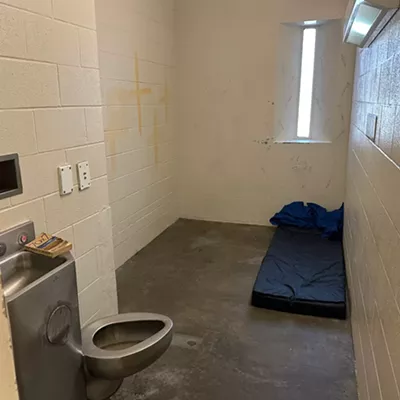Spokane County Detention Services Director John McGrath tried for two years to replenish a depleted medical staff with no success. Earlier this year, when three nurses quit, he was left with a staff too small to cover all the shifts, and was faced with a tough decision: let the wound fester or put a bandage on it.
He could keep trying to recruit nurses locally — and jeopardize the health and safety of an overcrowded jail population — or hire NaphCare Inc. to bring in their own nurses. He chose the latter, and in May 2016, Spokane County signed a six-month, $2.6 million contract with the third-party company that provides medical services for jails around the country, including Pierce County, Washington. The contract was approved unanimously by the Spokane County Board of Commissioners.
The jail's medical department is now fully staffed for the first time in at least two years, but that's come at a cost beyond the multimillion-dollar contract. Two of the jail's longtime doctors recently left amid concerns about the standard of care that NaphCare provides.
Criswell Kennedy, who had worked as a physician in the county jail for the previous 15 years, left after NaphCare staff continually reversed his medical orders. Kennedy says the quality of medical care that inmates are receiving is suffering.
McGrath, who notes that he is not a doctor and cannot weigh in on specific medical decision-making, chalks up Kennedy's concerns to an aversion to change. He says the jail's medical unit is now operating according to national standards, and points to NaphCare's accreditation with the National Commission on Correctional Health Care. The jail also now has enough nurses to screen inmates during booking, McGrath says.
Naphcare didn't return messages seeking comment. But Kennedy, for his part, says NaphCare's changes in protocol could potentially open up the county to lawsuits.
"I think this contract is going to cost the county a lot of money to have this outfit be their medical provider," Kennedy says. "And it's going to cost the inmates something, too. They're not going to receive the kind of medical care that I think they deserve."
Generally, a diabetic's blood sugar level is supposed to hover around 180 millimeters per deciliter, Kennedy says. During the time he worked alongside NaphCare staff, incarcerated diabetics' blood sugar levels would consistently spike to 500-600 milliliters, due to the limited range of medication that NaphCare's protocol allows.
He gives another example of a typical scenario with antipsychotic medication. Say a person is booked into jail and is taking meds to control their schizophrenia, Kennedy posits. Those pills are relatively expensive, so now, under NaphCare's watch, the inmate might be switched to another, cheaper brand. Those cheaper pills can carry excessive side effects, he says.
"I'm all in favor of using medicines that are less expensive. But that's not their standard of care as determined by their doctor in the community," says Kennedy. "These people are innocent until proven guilty, and they don't deserve to have excessive side effects just because you want to save money."
He adds that the cheaper pills might not control the condition as effectively.
The issues, Kennedy says, are a diminished quality of care along with NaphCare's "formulary" of medication — policies limiting the range of drugs that they are authorized to prescribe. If an inmate gets booked while taking drugs outside that range, they're usually put on something else.
"Our opinion was that if you have a person who is stabilized on a medication, then it's probably a good idea to keep them on that medication," he says.
Indeed, a man was recently hospitalized due to a medical error when he was given someone else's medication, according to jail records.
"There have been medical errors by our staff and NaphCare staff, because we're still a hybrid staff," McGrath says. "Those errors get reviewed to determine if a nurse was following procedure, and so we can get to the bottom of what happened."
McGrath says that review has not yet been completed, and the man has been released from the hospital. The jail could not provide the man's name or the specific medical issue due to a federal health care privacy law.
Kennedy isn't the only one taking issue with NaphCare's standard of care. Across the country, horror stories have emerged.
The for-profit provider has been involved in numerous lawsuits, including one in Virginia this year, in which a 24-year-old man allegedly starved to death in his cell.
In that case at the Hampton Roads Regional Jail, Jamycheal Mitchell, a mentally ill man, was arrested for stealing $5.05 worth of snacks and died after four months from a heart condition "accompanying wasting syndrome," according to the lawsuit. A medical examiner said Mitchell was "nearly cachectic," meaning that his weight loss could not be reversed.
NaphCare has denied those accusations, according to a statement provided to CNN. The matter is still waiting to be resolved in court.
Asked if he considered NaphCare's history of litigation before contracting with them, McGrath says he was satisfied by the company's explanation.
"We discussed some of their current lawsuits, and based on our review and having been in situations where we are under litigation for medical reasons, their answers were adequate enough," he says. "We've experienced a significant number of deaths [in the jail] recently, and we understand the other side of that, what comes into jail and how we need to treat and deal with those patients."
Notwithstanding Kennedy's concerns, the jail's reliance on NaphCare's staff and protocol has an important benefit.
Spokane County Commissioner Shelly O'Quinn says the alternative to NaphCare was a seriously understaffed medical department for who knows how long — putting inmates and jail staff at risk. That's an option McGrath says they couldn't afford, considering the multiple inmate deaths last year.
"We're staffed 24/7 at the jail, and at Geiger [Corrections Center]," O'Quinn says. "That's phenomenal. We have nurses at booking now, so when someone comes in high, we have a nursing staff there to evaluate them to see if they're able to come into the jail, or if they need to go to the hospital."
Furthermore, O'Quinn says, NaphCare agreed to a six-month contract, which was an important factor in the commissioners' decision.
Kennedy, for his part, says the increase in staff is indeed an upside.
"At the point they came in, we were woefully understaffed," he says. "So the staff-to-prisoner ratio is much improved. There was a lot less pressure on the remaining nurses to work overtime." ♦





















